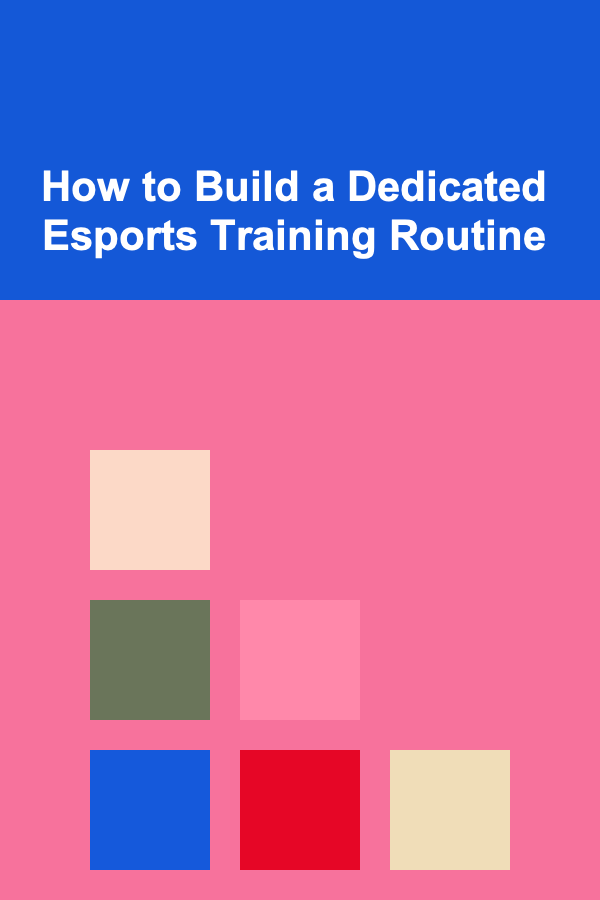
How to Build a Dedicated Esports Training Routine
ebook include PDF & Audio bundle (Micro Guide)
$12.99$5.99
Limited Time Offer! Order within the next:

Esports is more than just playing video games. It's an industry that has evolved into a highly competitive arena with professional players, coaches, analysts, and millions of passionate fans. The success of top-tier esports players doesn't just stem from natural talent; it's the result of long hours of dedicated practice, strategic thinking, and meticulous planning.
If you're an aspiring esports player looking to take your skills to the next level, developing a structured training routine is essential. Just like any other sport, esports requires consistent practice, self-discipline, and attention to detail. This article will provide you with the essential steps to build a dedicated esports training routine, covering everything from physical and mental preparation to in-game mechanics and strategies.
Understanding the Demands of Esports
Before diving into how to structure your routine, it's crucial to understand what makes esports different from regular gaming. Esports requires both mental and physical endurance, as well as strategic thinking. While playing for extended periods can feel like a workout, it's also mentally taxing. Top-tier esports athletes must have the following:
- Mental Focus: The ability to make quick decisions, plan ahead, and remain focused under pressure is essential.
- Physical Endurance: While you might not be running around on a field, esports players still need to have physical stamina to sit and play for hours while maintaining peak performance.
- Team Coordination: For team-based esports, players must communicate and cooperate efficiently, often under intense pressure.
- Game-Specific Knowledge: Understanding the mechanics, strategies, and nuances of the game you're playing is a constant necessity.
With this in mind, creating a training routine that improves all aspects of your game is crucial. Let's break down how you can do this effectively.
Step 1: Define Your Goals
Before you begin your training routine, it's important to set clear and realistic goals. Understanding what you want to achieve will help you tailor your practice and measure your progress over time.
Short-Term Goals
Short-term goals help you focus on immediate improvements. These might include:
- Improving reaction time.
- Mastering a specific champion or hero.
- Increasing your ranking in a particular game mode or ladder.
- Developing specific in-game skills, such as accuracy or map awareness.
Long-Term Goals
Long-term goals are broader and reflect your career aspirations in esports. These might include:
- Becoming a top-tier professional player in your game of choice.
- Joining a high-ranking esports team.
- Competing in major tournaments.
- Building a strong personal brand and stream following.
Once you've outlined your goals, you can structure your training routine to focus on both short-term improvements and long-term growth.
Step 2: Focus on Physical Health and Endurance
While esports might not seem physically demanding at first glance, maintaining your body is essential for peak performance. Extended gaming sessions can lead to physical strain, including wrist pain, eye strain, back problems, and poor posture. A healthy body supports a healthy mind, so maintaining your physical health is crucial.
Regular Exercise
Incorporate regular physical exercise into your training routine to build stamina, improve reaction time, and reduce stress. Cardio exercises, strength training, and flexibility exercises will improve your overall fitness and help with mental clarity and focus.
- Cardio: Regular cardio exercises like running, cycling, or swimming will boost your endurance and keep you energized during long gaming sessions.
- Strength Training: Strength training helps with posture, reducing the strain on your neck, back, and wrists.
- Stretching: Incorporate regular stretching or yoga to prevent muscle tightness, improve flexibility, and avoid injuries like carpal tunnel syndrome.
Sleep and Rest
Sleep is essential for mental clarity, focus, and reaction times. A lack of rest can impair cognitive function, making you more prone to mistakes in-game. Aim for 7-9 hours of sleep each night to ensure you're well-rested and ready to train or compete.
Nutrition
Proper nutrition plays a significant role in keeping your body and mind in optimal condition. Consuming balanced meals with a focus on protein, healthy fats, and carbohydrates will fuel your body for long gaming sessions. Avoid excessive caffeine or junk food, which can lead to crashes and a lack of focus.
- Hydration: Drinking plenty of water throughout the day is critical for maintaining focus and mental clarity.
- Supplements: Some esports players take supplements like omega-3 fatty acids or vitamins to boost cognitive function, but always consult with a healthcare professional before incorporating any supplements.
Step 3: Develop Mental Endurance and Focus
Esports is often referred to as a mental sport because of the incredible cognitive demands it places on players. Mental endurance, focus, and emotional regulation are all key components of a successful esports training routine.
Meditation and Mindfulness
Incorporate mindfulness or meditation into your daily routine to reduce stress and improve focus. Practices like deep breathing or guided meditation can help calm your mind, especially before intense practice sessions or matches.
- Visualization: Visualizing success or strategies can also help with focus and preparation. Spend a few minutes each day imagining yourself performing well in a tournament or overcoming obstacles in-game.
Mental Toughness and Resilience
Building mental toughness is essential for dealing with high-pressure situations, such as competing in high-stakes tournaments. Resilience helps you stay calm during stressful moments and bounce back from mistakes.
- Self-Talk: Positive self-talk can help you maintain confidence, even during challenging times.
- Journaling: Keep a journal to track your progress, setbacks, and emotional responses during training and competitions. This can help you identify areas for improvement in both performance and mindset.
Focus Training
Esports players need to be able to concentrate on multiple aspects of the game at once. One way to improve this is by practicing multitasking and focus training. Tools and apps that train cognitive functions like memory, attention span, and reaction times can be helpful in enhancing focus during gaming sessions.
Step 4: Master Game-Specific Skills
Each esport has its own set of mechanics and skills that require attention. Whether you're playing a first-person shooter (FPS), multiplayer online battle arena (MOBA), real-time strategy (RTS), or any other genre, mastering game-specific mechanics is vital.
In-Game Mechanics
Identify the core mechanics of your game and focus on mastering them. This might include:
- Accuracy : Practice your aim, reflexes, and reaction time if you're playing a shooter like Counter-Strike or Overwatch.
- Strategic Decision-Making : In strategy games like League of Legends or Dota 2, mastering map awareness, resource management, and team coordination is essential.
- Game Knowledge: Understanding game updates, meta shifts, and character abilities is crucial for adapting to the ever-changing esports landscape.
Custom Training Modes
Many esports titles have practice modes where players can focus on specific mechanics. Spend time in these modes to improve your skills without the distractions of a live game. Practice drills such as shooting targets, timing abilities, or understanding game mechanics can help you stay sharp.
Review and Analyze Past Performances
Incorporating review and self-analysis into your routine is one of the best ways to improve. After each gaming session, review your gameplay and identify mistakes or areas for improvement. This could be done via replays or recordings, allowing you to analyze decision-making, positioning, and communication with teammates.
You can also watch professional players' streams or YouTube content to gain insights into their decision-making, strategies, and tactics.
Step 5: Build Team Communication and Synergy
For team-based games like Overwatch , Valorant , or League of Legends, effective communication and team synergy are vital for success. Building these skills into your training routine is essential for improving both individually and as part of a team.
Team Practice Sessions
Work with your teammates regularly, even outside of official tournaments or scrims. This includes practicing team strategies, communication, and synergy. Learn how to coordinate with your team and how to work together to execute strategies effectively.
- Review Sessions: After each practice session or match, hold a team review where you go over mistakes, discuss strategies, and provide feedback to each other.
- Focus on Communication: Practicing effective communication in-game is essential for success. Work on clear, concise communication and ensure everyone is on the same page during gameplay.
Conflict Resolution
Disagreements and conflicts can arise within teams, but learning how to resolve them quickly and effectively is important. As part of your training, practice being a good listener, providing constructive feedback, and handling conflicts professionally.
Step 6: Establish a Consistent Practice Schedule
Consistency is key when it comes to esports training. Just like any professional athlete, esports players need to maintain a regular schedule to improve and maintain their performance. Create a structured practice routine that includes daily and weekly goals.
Daily Training Schedule
A typical daily training schedule for an esports player might look like this:
- Warm-up: 15-30 minutes of light practice to get into the flow of the game (accuracy drills, reflex training, etc.).
- Main Practice: 2-4 hours of focused practice on specific areas (game mechanics, team coordination, or strategy).
- Review and Analysis: 30 minutes to 1 hour of analyzing your gameplay, watching replays, and identifying areas for improvement.
- Physical Exercise: 30-60 minutes of physical activity (cardio, strength training, or stretching).
Weekly Training Schedule
Your weekly schedule should incorporate more extensive review sessions, team scrims, or competitive matches. Ensure you're balancing your time between individual practice and team activities.
- Solo Practice: Spend at least 3-4 hours per week focusing on your individual skills.
- Team Scrims: Schedule 3-4 scrims or team practice sessions per week to build team coordination and synergy.
Step 7: Track Progress and Adjust Your Routine
Tracking your progress is essential for identifying areas of improvement and adjusting your training routine. Use tools like performance trackers, gaming analytics platforms, or even personal journals to record your results over time.
Use Data to Your Advantage
Many esports titles provide data on your performance, such as accuracy, damage dealt, and match outcomes. Review these stats regularly to track improvements and identify areas that need more focus.
Adjust Based on Results
As you progress, you may need to adjust your routine based on the results. If you notice a specific area is improving well, you may want to allocate more time to refining other aspects of your gameplay. Likewise, if you feel burnout setting in, consider adjusting your schedule to include more rest or alternative activities.
Conclusion
Building a dedicated esports training routine requires dedication, consistency, and the right balance of physical, mental, and game-specific practices. By incorporating these steps into your daily routine, you'll be setting yourself up for success in the competitive esports world. Remember that improvement takes time, so stay patient and committed to your goals. With the right mindset and training regimen, you can unlock your full potential and excel in the world of esports.

How To Get Feedback on Your Writing (and Use It Wisely)
Read More
How to Perform Regular Home Security Audits to Keep Your Family Safe
Read More
How to Safeguard Your Home During the Holidays
Read More
How to Select the Best Organizers for Your Office Drawers
Read More
Lowering Mortgage Payments Through Refinancing: Is It the Right Choice for You?
Read More
How to Study Coral Bleaching and Recovery: A Comprehensive Guide
Read MoreOther Products

How To Get Feedback on Your Writing (and Use It Wisely)
Read More
How to Perform Regular Home Security Audits to Keep Your Family Safe
Read More
How to Safeguard Your Home During the Holidays
Read More
How to Select the Best Organizers for Your Office Drawers
Read More
Lowering Mortgage Payments Through Refinancing: Is It the Right Choice for You?
Read More